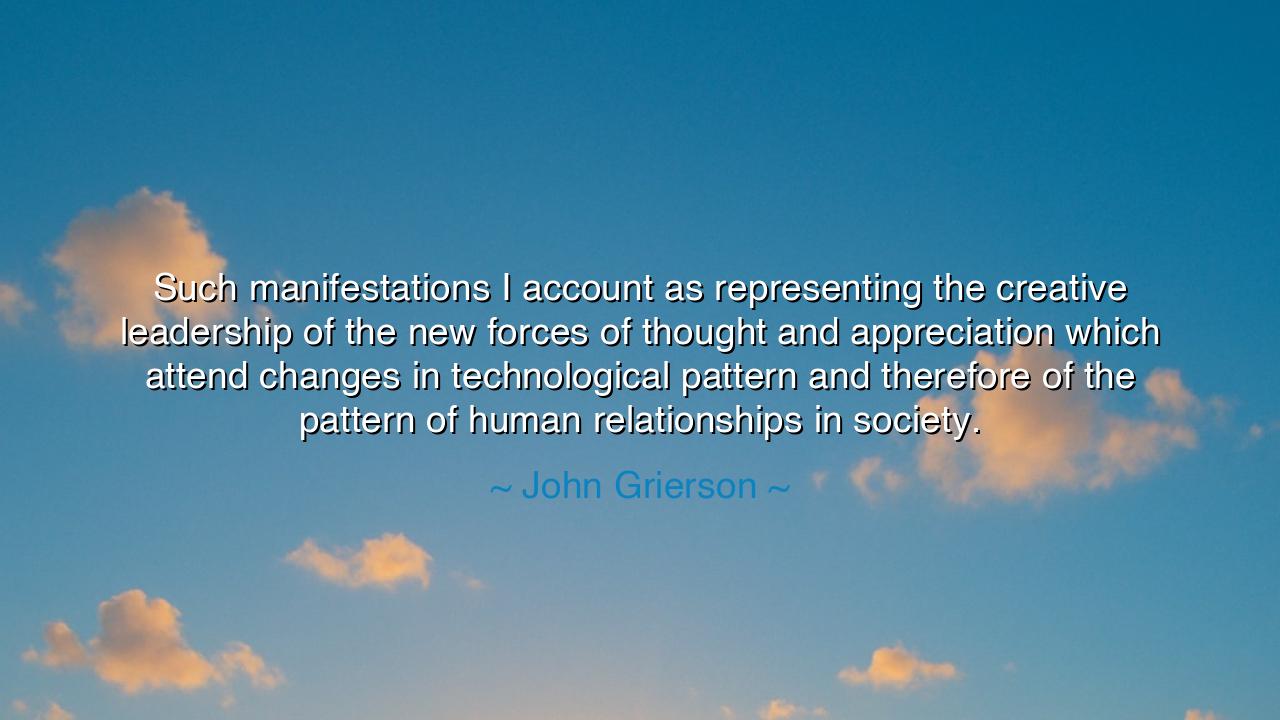
Such manifestations I account as representing the creative
Such manifestations I account as representing the creative leadership of the new forces of thought and appreciation which attend changes in technological pattern and therefore of the pattern of human relationships in society.






Hear, O children of progress, the words of John Grierson, father of the modern documentary, who proclaimed: “Such manifestations I account as representing the creative leadership of the new forces of thought and appreciation which attend changes in technological pattern and therefore of the pattern of human relationships in society.” In this utterance shines the recognition that whenever the tools of mankind change, so too must the spirit, the vision, and the leadership that guide society. For invention alone is not enough—without the soul to interpret it, technology is but a shell, and society a ship without a rudder.
The meaning of his words is thus: every transformation in technology gives birth to new ways of thinking, new ways of living, and new forms of art. These are the “manifestations” of which Grierson spoke—the visible signs of invisible revolutions. It is not the machine alone that alters the world, but the creative leadership that shows humanity how to think differently in its presence. The steam engine brought not just locomotion, but the age of industry; the printing press brought not just books, but the awakening of minds. Always, the technological pattern reshapes the pattern of human relationships.
Consider the story of the printing press in the days of Gutenberg. It was not only the invention of movable type that shook the world, but the flood of ideas it unleashed. Pamphlets of reformers, treatises of philosophers, stories of poets—all found voice in this new medium. Out of this arose the creative leaders of thought: Martin Luther challenging old powers, Erasmus spreading humanist wisdom, Galileo publishing truths of the heavens. Here we see clearly what Grierson declared: the machine is a spark, but the flame of leadership and thought is what reshapes society.
In Grierson’s own age, the cinema became such a tool. The camera did not merely record images; it altered how men perceived reality. Grierson himself, with his documentaries, sought not entertainment alone, but the education of the people. He saw that new technology could serve as the manifestation of a deeper force—an instrument of democracy, a way to bind society together by new forms of shared appreciation and awareness. He believed, as his words declare, that the artistry of film represented the creative leadership required for an age reshaped by machines, cities, and new human bonds.
The lesson is timeless. When new technological patterns emerge—be it the telegraph, the radio, the internet, or artificial intelligence—they inevitably change how men speak, think, and relate to one another. Yet technology alone cannot guide this transformation. It demands creative leadership: visionaries who interpret the change, philosophers who name it, artists who embody it, teachers who shape it. Without such leadership, society risks being dragged by its machines instead of guiding them toward human flourishing.
O listener, take this teaching to heart: do not despise the new, nor worship it blindly. When fresh inventions arise, ask what thought and appreciation they awaken. Ask how they alter the bonds of family, of community, of nation. And then seek leaders—whether in art, in politics, in learning—who can harness these forces not for destruction or vanity, but for justice, beauty, and truth. For every new machine is a seed, but only wise leadership can grow it into a tree that gives life.
Practical action lies before you: embrace technological change with eyes open. Learn its workings, but also reflect on its meaning. Support artists, educators, and thinkers who interpret these new forces with wisdom. And in your own life, strive to be a creative leader, using the tools of your age to uplift, to enlighten, and to strengthen the bonds of humanity.
Thus remember the wisdom of John Grierson: the tools of mankind ever shift, but the destiny of mankind lies in how we guide them. The manifestations of new art and thought are not trivial—they are the signs of transformation. Honor them, cultivate them, and let them be the heralds of a society made wiser, nobler, and more deeply human.






AAdministratorAdministrator
Welcome, honored guests. Please leave a comment, we will respond soon